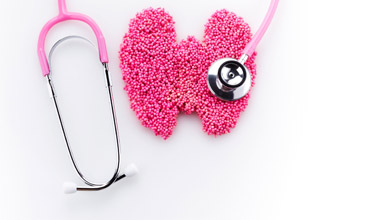January is thyroid awareness month. Most people know how important the heart, lungs, and kidneys are to our health. But have you considered the crucial role of the thyroid gland? The hormone released by this gland is integral to proper functioning of the heart, brain, other organs and muscles. In children, the thyroid hormone is essential for normal brain and nervous system development.
Understanding the Thyroid Gland
The thyroid gland is shaped like a butterfly and is in the front of the neck. It makes a hormone called T4 that helps regulate energy levels and metabolism. If you have too much T4, many of your body’s functions are sped up. Your heart beats faster. You may have weight loss (even with increased appetite), trouble concentrating, nervousness, shaky hands and insomnia. This condition is called hyperthyroidism.
On the other hand, if you have too little thyroid hormone or T4 in your body, many of your body’s functions are slowed down. Your heart beats slower. You may feel tired, depressed and unable to concentrate. Some people have increased sensitivity to cold, dry skin, hair loss or constipation. Others may gain weight or have a puffy face. This condition is called hypothyroidism.
The pituitary gland located in the brain helps regulate the amount of thyroid hormone in the body. To do this, it releases a hormone called thyroid stimulating hormone (TSH). If the thyroid gland isn’t making enough T4, the pituitary gland produces more TSH as a signal to the thyroid gland to work harder. The reverse is true as well. If the thyroid gland is making too much T4, the pituitary gland produces less TSH as a signal for the thyroid gland to slow down.
Thyroid Deficiency in Babies and Young Children
In the United States newborn babies are routinely tested to see if their thyroid gland is functioning normally. Doctors look for low levels of T4 and high levels of TSH to diagnose congenital hypothyroidism. Congenital means that the baby is born with the condition. About 1 in every 1700 newborns are found to have hypothyroidism according to the American Thyroid Association. Early diagnosis and treatment are particularly important because the thyroid hormone is necessary for normal growth and development. A review of the recent congenital hypothyroidism guidelines warns that “a deficiency during the first 3 months of life results in a marked decrease in intelligence” because brain growth requires thyroid hormone. Medical care for these children should include consultation with a pediatric endocrinologist. Screening at birth saves these children from severe developmental delays. Unfortunately, screening is not available for about 70% of newborns in the world.
The Endocrine Society cautions that some babies or young children can have congenital hypothyroidism even though initial screening results were normal. Look for signs, such as yellowing of the skin and eyes, feeding problems, constipation, swollen belly, puffy-looking face, large thick tongue and excessive sleepiness. Contact your pediatrician right away if you notice worrying signs.
Thyroid Problems in Older Children
and Teens
Hypothyroidism is very common and occurs in about 1 in every 1,250 children according to the American Academy of Pediatrics. Older children and teens usually have the same signs and symptoms of hypothyroidism as adults. Other signs specific to this age group noted by the Mayo Clinic are delayed appearance of permanent teeth, being shorter in height than normal, delayed puberty and poor mental development.
Hyperthyroidism is less common but does occur in older children and teens. Signs of hyperthyroidism may be mistaken for signs of other conditions. Keep notes on worrisome signs and talk to your child’s pediatrician. A thorough discussion of signs and symptoms in addition to blood tests can aid in diagnosis.
Treatment for Low Thyroid
Management for thyroid deficiency is to replace the missing hormone with a synthetic thyroid hormone called levothyroxine. Dosing is adjusted by monitoring thyroid hormone levels in the blood. Many patients will need thyroid hormone replacement therapy their entire lives. For some babies the deficiency may be temporary; an endocrinologist should guide the decision to discontinue treatment.
Adults with hypothyroidism typically get blood tests to check hormone levels once a year. Children need blood tests more often because their bodies are growing. Babies with congenital hypothyroidism need to have blood tests every 1 to 2 months from birth to six months old then every 2 to 3 months thereafter. Their pediatrician should closely monitor growth, brain development and hearing.
RESOURCES FOR PARENTS
Go to the American Thyroid Association website to learn more:
www.thyroid.org/wp-content/uploads/patients/brochures/Hypo_brochure.pdf
www.thyroid.org/wp-content/uploads/patients/brochures/congenital-hypothyroidism-brochure.pdf
Brenda Schoolfield is a medical writer and editor who lives in Austin. Sugar, her cocker spaniel and sometimes a rescue foster dog or two keep her company while she writes.


















